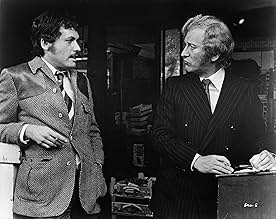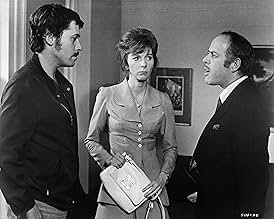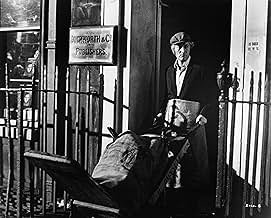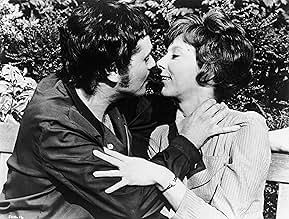Um assassino em série estrangula uma mulher com uma gravata. A polícia de Londres tem um suspeito, mas ele não é o homem certo.Um assassino em série estrangula uma mulher com uma gravata. A polícia de Londres tem um suspeito, mas ele não é o homem certo.Um assassino em série estrangula uma mulher com uma gravata. A polícia de Londres tem um suspeito, mas ele não é o homem certo.
- Direção
- Roteiristas
- Artistas
- Prêmios
- 3 vitórias e 8 indicações no total
- Direção
- Roteiristas
- Elenco e equipe completos
- Produção, bilheteria e muito mais no IMDbPro
Avaliações em destaque
After the poorly received Torn Curtain and Topaz, Hitchcock returned home to both the murder genre and to Covent Gardens in London to film Frenzy, a lurid tale of a serial killer and the man caught up as the prime suspect. The only feeling of new from the film comes from the use of nudity and a particular focus on the real killer, and yet it's still a solidly built thriller, the sort of thing that Hitchcock could seemingly do in his sleep.
There's a killer on the loose in London, and he has a trademark in that he rapes his female victims and then strangles them with a necktie. In the city is Dick, a former RAF pilot who's had a hard time of it since he left the service, going from job to job and recently divorced. He starts the movie by taking a drink from the pub where he works and immediately getting fired despite his protestations, and the support of his girlfriend Babs, that he was going to pay for it. Without a job, Dick goes to his ex-wife for some kind of support, which he gets through dinner and twenty pounds that she slips into his pocket without his knowledge.
Later, Dick's friend Rusk shows up to Dick's wife's office, a matchmaking service, and demonstrates for the audience, in rather shocking detail, how he is the necktie killer. Now, the reveal of the identity of the serial killer is an interesting twist on the genre. We see Dick and Rusk interacting at several points, events that tell the audience of the danger Dick is putting himself into while he doesn't realize it himself. It's a new version of the tried and true method of creating tension. The other interesting thing about the early reveal is that about half of the movie is from Rusk's own perspective, including the movie's best single sequence.
Rusk has murdered another girl and shoved her body into a potato sack onto a truck. As he returns to his apartment, he realizes that he's lost his pin and that the girl had grabbed onto it. He needs to get back to the body and retrieve the pin, but as he's hiding in the back of the truck, the driver comes and drives off. Rusk has to negotiate the logistics of hiding in the back of a potato truck while digging out a corpse, breaking the fingers on the right hand because of rigor mortis, retrieving the pin, and then getting out again. I can imagine Hitchcock laughing himself silly as he conceived of the scene (not shooting, it seemed like a nightmare to shoot). It's such a twist on the sort of sequence where the bad guy, who's already done the bad dead, is trying to get out of trouble, and the filmmaking is so effective that the audience is along with him, not really cheering him on, but instinctively sharing the same concerns as him.
Another wonderfully amusing aspect of the film, which feels a little disassociated from the rest and gives some pause in terms of praise, is the chief inspector on the case and his wife. The film uses two dinners as springboards for the inspector to explain the police's position at two different points in the film, and instead of just straight exposition the scenes are played out as the wife brings out the most bizarre dishes that look completely inedible. However, since the police inspector is such a polite British man of good manners, he finds ways to get around eating the food he obviously has great distaste for, one of which made my wife cringe audibly as he did it. They're two of the most purely entertaining scenes of exposition in Hitchcock's filmography.
So, yeah, I like it. I do feel like it's a return to form after Topaz, though I seem to like Torn Curtain more than most so it's not like some sort of great gap of quality. One of the drawbacks of the film's approach to treating the two characters, the criminal and the falsely accused, with equal measure is that they end up a bit thinner than they otherwise could be. Dick, in particular, feels like a generic Hitchcock protagonist rather than a strongly written character, especially after the first act when the focus on the actual crimes gets taken up.
It's a gripping little murder thriller set in Alfred Hitchcock's old stomping grounds with some wonderful sequences. It seems to have been a bit overpraised contemporaneously, but that doesn't detract from the fact that it's still a solidly good film.
There's a killer on the loose in London, and he has a trademark in that he rapes his female victims and then strangles them with a necktie. In the city is Dick, a former RAF pilot who's had a hard time of it since he left the service, going from job to job and recently divorced. He starts the movie by taking a drink from the pub where he works and immediately getting fired despite his protestations, and the support of his girlfriend Babs, that he was going to pay for it. Without a job, Dick goes to his ex-wife for some kind of support, which he gets through dinner and twenty pounds that she slips into his pocket without his knowledge.
Later, Dick's friend Rusk shows up to Dick's wife's office, a matchmaking service, and demonstrates for the audience, in rather shocking detail, how he is the necktie killer. Now, the reveal of the identity of the serial killer is an interesting twist on the genre. We see Dick and Rusk interacting at several points, events that tell the audience of the danger Dick is putting himself into while he doesn't realize it himself. It's a new version of the tried and true method of creating tension. The other interesting thing about the early reveal is that about half of the movie is from Rusk's own perspective, including the movie's best single sequence.
Rusk has murdered another girl and shoved her body into a potato sack onto a truck. As he returns to his apartment, he realizes that he's lost his pin and that the girl had grabbed onto it. He needs to get back to the body and retrieve the pin, but as he's hiding in the back of the truck, the driver comes and drives off. Rusk has to negotiate the logistics of hiding in the back of a potato truck while digging out a corpse, breaking the fingers on the right hand because of rigor mortis, retrieving the pin, and then getting out again. I can imagine Hitchcock laughing himself silly as he conceived of the scene (not shooting, it seemed like a nightmare to shoot). It's such a twist on the sort of sequence where the bad guy, who's already done the bad dead, is trying to get out of trouble, and the filmmaking is so effective that the audience is along with him, not really cheering him on, but instinctively sharing the same concerns as him.
Another wonderfully amusing aspect of the film, which feels a little disassociated from the rest and gives some pause in terms of praise, is the chief inspector on the case and his wife. The film uses two dinners as springboards for the inspector to explain the police's position at two different points in the film, and instead of just straight exposition the scenes are played out as the wife brings out the most bizarre dishes that look completely inedible. However, since the police inspector is such a polite British man of good manners, he finds ways to get around eating the food he obviously has great distaste for, one of which made my wife cringe audibly as he did it. They're two of the most purely entertaining scenes of exposition in Hitchcock's filmography.
So, yeah, I like it. I do feel like it's a return to form after Topaz, though I seem to like Torn Curtain more than most so it's not like some sort of great gap of quality. One of the drawbacks of the film's approach to treating the two characters, the criminal and the falsely accused, with equal measure is that they end up a bit thinner than they otherwise could be. Dick, in particular, feels like a generic Hitchcock protagonist rather than a strongly written character, especially after the first act when the focus on the actual crimes gets taken up.
It's a gripping little murder thriller set in Alfred Hitchcock's old stomping grounds with some wonderful sequences. It seems to have been a bit overpraised contemporaneously, but that doesn't detract from the fact that it's still a solidly good film.
Hitchcock back in his native land concocting a classic British thriller with a large dose of humor and cruelty. Jon Finch plays the innocent man on the run. Jon Finch ! He was Polanski's Macbeth. A great but uncomfortable presence on the screen. I can't quite explain it. The first time I saw him was in a small but pungent scene as a hustler in John Schlesinger's Sunday Bloody Sunday. In Frenzy he falls in several traps, as a character and as an actor. He doesn't have the lightness nor the charm of a Cary Grant but he has a weight of his own that makes Frenzy truly dark. Anna Massey plays the girlfriend, a part that, apparently, was offered to Helen Mirren in 1972 but she turned down, as a young actress she had her eyes set on Jack Nicholson for instance, feeling that Hitchcock was old hat. Maybe she was right, but I wonder if she regrets it. Billie Whitelew is also in the cast plus Alec McCowen as the Inspector from Scotland Yard and Vivien Merchant as his wife in a delicious Hitchcokian touch. If you're a Hitchcock fan I'm sure you've seen it but if you haven't, you must.
After 30 years in the USA and after the disappointments of "Torn Curtain" (1966) and "Topaz" (1969), Alfred Hitchcock came back to his native Britain for this film -written by Anthony Shaffer from a novel by Arthur La Bern.
"Frenzy" is his penultimate movie, certainly the best one of his last period. The way the Master films is very classic -deliberately old fashioned; at the same time all the charachters are very modern -they belong to a more and more decadent and neurotic London.
Almost from the beginning we know who the criminal is, and Hitchcock enjoys himself in showing how the man tries to escape and how he betrays people. Director's trademarks are also back in force: suspense (a lot!) and humour -more sarcastic and sharper than ever.
For "Frenzy" the Master doesn't get movie stars, instead he chooses local stage actors. In my opinion he does this because, first, he wants the film to be very English. Furthermore, he wants this time more ordinary faces for making the story more shocking (with famous actors in the main roles, the plot -in a certain way- could be identified mostly with them and loose strength, instead Hitchcock avoids that "paradox"...).
Maybe "Frenzy" is not an unforgettable masterpiece like "Psycho", "Vertigo", "Birds" or many other works. But it is a great movie indeed.
"Frenzy" is his penultimate movie, certainly the best one of his last period. The way the Master films is very classic -deliberately old fashioned; at the same time all the charachters are very modern -they belong to a more and more decadent and neurotic London.
Almost from the beginning we know who the criminal is, and Hitchcock enjoys himself in showing how the man tries to escape and how he betrays people. Director's trademarks are also back in force: suspense (a lot!) and humour -more sarcastic and sharper than ever.
For "Frenzy" the Master doesn't get movie stars, instead he chooses local stage actors. In my opinion he does this because, first, he wants the film to be very English. Furthermore, he wants this time more ordinary faces for making the story more shocking (with famous actors in the main roles, the plot -in a certain way- could be identified mostly with them and loose strength, instead Hitchcock avoids that "paradox"...).
Maybe "Frenzy" is not an unforgettable masterpiece like "Psycho", "Vertigo", "Birds" or many other works. But it is a great movie indeed.
On the surface, Alfred Hitchcock's FRENZY seems to be a compelling thriller about a serial killer stalking young London girls. It almost is a horror film about film. Jon Finch is a London Bartender caught stealing DRINKS, and is fired. His best pal, Rusk (where are you, Barry Foster?) a GREEN-GROCER, offers him FOOD and encouragment. Meanwhile Scotland Yard is seeking a serial killer who rapes and strangles his victims. The head detective on the case has to endure his wife's HIDEOUS GOURMET COOKING while tracing clues such as a body found in a POTATO SACK, or the half eaten APPLE at a murder site. Also the food refernces abound in the dialog "Don't squeeze the goods till they are yours" the killer tells his victim, or the cop saying "We have to catch him before his appetite is wetted again."
All this makes FRENZY a rich, creepy classic thriller. The food refrences aren't overdone. They are cooked just perfect. Delicious!
All this makes FRENZY a rich, creepy classic thriller. The food refrences aren't overdone. They are cooked just perfect. Delicious!
Frenzy follows the misadventures of ex-RAF man Jon Finch, who is framed for a particularly nasty series of 'necktie' murders for which his hot-temper and self-pity do not help..
The more one sees this film, the more holes appear or seem to appear. Finch is supposed to be an ex-squadron-leader with a fine record, but is too young to have done anything in WWII. The original novel came out in 1949 or thereabouts, so a little tweaking should have been in order. The first murder / assault shown seems to be done in rather too much detail and is possibly too lurid. In addition, there doesn't seem to be anything to tie him up with the previous murders.
These grumbles aside (and one could pick a few more holes if required), Frenzy held my attention reasonably well, and although at times it doesn't look too Hitchcockian, there are enough bits to make one aware of his presence. He is ably served by his cast of Barry Foster, Clive Swift (a fellow RAF man, but 'under the thumb'), the late Billie Whitelaw as Swift's acid-tongued wife, Barbara Leigh-Hunt as Finch's successful ex-wife, Anna Massey and Bernard Cribbins, to name a few.
The police are represented by Alec McCowen and Michael Bates, together with a series of running jokes on the frightful dishes McCowen's wife (Vivien Merchant) is serving up as a result of a gourmet course she is attending. This was Hitchcock's first British film in about twenty years, and had a mixed reception. The years have been kind to it, though, and it seems to have become more generally accepted, and there is enough action in it to keep one interested.
The more one sees this film, the more holes appear or seem to appear. Finch is supposed to be an ex-squadron-leader with a fine record, but is too young to have done anything in WWII. The original novel came out in 1949 or thereabouts, so a little tweaking should have been in order. The first murder / assault shown seems to be done in rather too much detail and is possibly too lurid. In addition, there doesn't seem to be anything to tie him up with the previous murders.
These grumbles aside (and one could pick a few more holes if required), Frenzy held my attention reasonably well, and although at times it doesn't look too Hitchcockian, there are enough bits to make one aware of his presence. He is ably served by his cast of Barry Foster, Clive Swift (a fellow RAF man, but 'under the thumb'), the late Billie Whitelaw as Swift's acid-tongued wife, Barbara Leigh-Hunt as Finch's successful ex-wife, Anna Massey and Bernard Cribbins, to name a few.
The police are represented by Alec McCowen and Michael Bates, together with a series of running jokes on the frightful dishes McCowen's wife (Vivien Merchant) is serving up as a result of a gourmet course she is attending. This was Hitchcock's first British film in about twenty years, and had a mixed reception. The years have been kind to it, though, and it seems to have become more generally accepted, and there is enough action in it to keep one interested.
Você sabia?
- CuriosidadesAlfred Hitchcock originally planned to do his cameo as the body floating in the river. A dummy was even constructed to do the shot. The plans were changed and a female body, a victim of the Necktie Murderer, was used instead. Hitchcock instead became one of the members of the crowd who are listening to the speaker on the river bank. The dummy of Hitchcock was used in the typically humorous trailer hosted by Hitchcock.
- Erros de gravaçãoWhen examining the murder scene at the marriage bureau, a police officer brings the victim's handbag out to Inspector Oxford, who correctly holds it with a handkerchief to keep his fingerprints from contaminating the evidence. He then he sticks his ungloved hand inside and feels around, thus contaminating it with his own fingerprints.
- Citações
[last lines]
Chief Inspector Oxford: Mr. Rusk, you're not wearing your tie.
[Robert Rusk is speechless for a moment]
Robert Rusk: I...
[he drops the trunk that he has just dragged into the room]
- Cenas durante ou pós-créditosThe Universal Pictures logo does not appear on this film.
- Versões alternativasThe original UK cinema and initial 1989 CIC video releases were cut by 19 secs by the BBFC to remove shots of underwear removal and closeups of neck strangling from the murder scene. The cuts were restored in all later Universal video and DVD releases.
- ConexõesFeatured in The Dick Cavett Show: Alfred Hitchcock (1972)
Principais escolhas
Faça login para avaliar e ver a lista de recomendações personalizadas
Everything New on Netflix in June
Everything New on Netflix in June
No need to waste time endlessly scrolling — here's the entire lineup of new movies and TV shows streaming on Netflix this month.
- How long is Frenzy?Fornecido pela Alexa
Detalhes
- Data de lançamento
- País de origem
- Idioma
- Também conhecido como
- Frenesí
- Locações de filme
- The Globe pub, Bow Street, Covent Garden, Londres, Inglaterra, Reino Unido(pub where Blaney, Babs and Forsythe work)
- Empresa de produção
- Consulte mais créditos da empresa na IMDbPro
Bilheteria
- Orçamento
- US$ 2.000.000 (estimativa)
- Faturamento bruto mundial
- US$ 4.940
- Tempo de duração1 hora 56 minutos
- Proporção
- 1.85 : 1
Contribua para esta página
Sugerir uma alteração ou adicionar conteúdo ausente





































